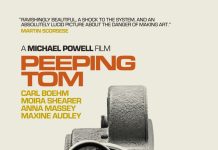Director: Lenny Abrahamson
Cast: Domhnall Gleeson, Michael Fassbender, Maggie Gyllenhaal
Rating: 15
Running time: 95
DVD Release date: 15 of September 2014
Frank is a taxing oddity. Like a fidget-prone toddler, it never settles, constantly shifting its attention from one perspective to the next. It potentially, therefore, may alienate its audience, yet it manages to be cogent enough to keep eyes-on-screen. The film begins by introducing Jon, a prosaic musician, who, lacking natural talent but not determination, spends his free time writing uninspiring, derivative songs. As luck would have it, Jon encounters an avant-garde rock band called ‘Soronprfbs’, who ask him if he’ll fill in for their troubled keyboard player.
The viewer is introduced to the band one-by-one. They’re an assortment of introspective, brooding artists, obsessed with their music to the point of madness. Frank, played by Michael Fassbender, as brilliant and versatile as ever, is the lead singer, strangely given to wearing a giant mask at all times. He’s enigmatic and treated like a guru by the others, channelling the prophetic aura of musicians like Ian Curtis and Jim Morrison – both in singing voice and purported disposition.
Frank’s sidekick Clara, a convincingly raging Maggie Glyenhaal, takes an instant dislike to Jon. At first this appears without reason, but masked by an impish, wimpy demeanour, Jon begins to negatively impact the band; he controls their social media, pushes for a more mainstream sound and organises trendy festival dates. Little by little the band’s trust in Jon disintegrates and they all leave except for Frank, who promptly has an on-stage breakdown during what is essentially Jon’s ‘unplugged’ vanity piece. Jon is the creative desire’s Antichrist, the Apollo to Frank’s Dionysus.
The tension between the inward-looking creativity of the band versus Jon’s outward-looking desire for the spectacle, adds to the film’s depth. Thankfully, much of the film’s quirkiness is more allegorical than self-referential. Even Frank’s mask acts as his (false) happy face, interestingly something his parents/super-ego encouraged him to have when he was young – to be happy, upright and forthcoming. In reality, behind the mask, Frank is a depressed genius. It is no coincidence that he repeatedly tells people what kind of smile he’s really ‘not’ making. It’s part of the stitching that keeps him together.
Whereas Frank specialises in hiding the truth of himself, Jon proliferates the lies and half-truths that lurk beneath the veneer of band hype. He is use to writing disingenuous tweets, so his selection of shocker film footage – gathered to bloat the band’s online fan base – is no surprise. In this respect Frank is a savvy film because it subtlety hints at the kind of cultural decadence online life perpetuates within youth culture: vicarious thrills of band member breakdowns are positively encouraged. Lurid publicity is prime publicity.
Frank is not a comedy. To genre bracket it as such would relegate it to failure. There are too many dense themes here to be so reductive. It does have its funny moments, however, for instance, Frank, in a state of stress, shows the rest of the band his ‘most likeable song’ in an effort to meet Jon’s requirements. The song is as wacky as ever. Also, the cliché of a band returning to nature to produce an experimental album, “away from the ‘man’, man!”, is Spinal-Tap-esque in its pseudo-profundity.
The ending of the film, although tonally at odds with the rest, still manages to conclude satisfactorily. The band is together again, Frank is mask free, playing his music honestly and openly. The band remain creatively-driven – playing to one-man-and-his dog – as they were meant to be. The film could have ended with the band becoming famous due to their obscurity; such is the trend of the online age, but it’s more appealing to have reached full circle; as an unlikely ode to creative spirit.
Verdict
![]()






























